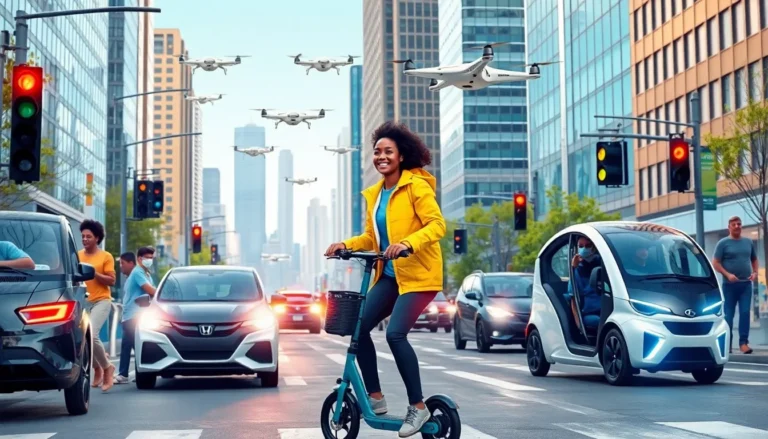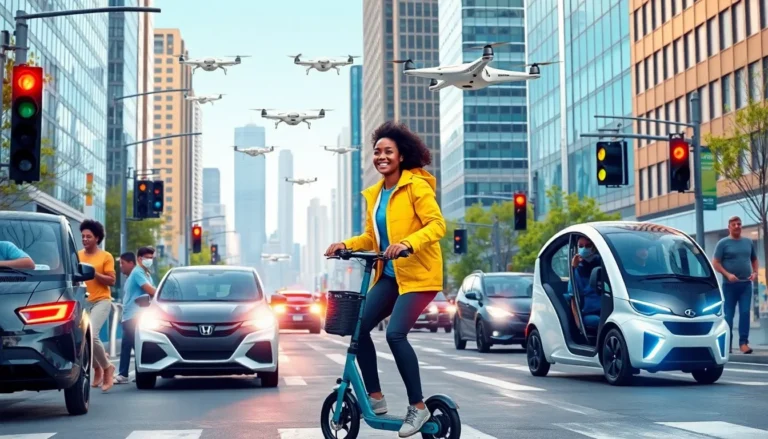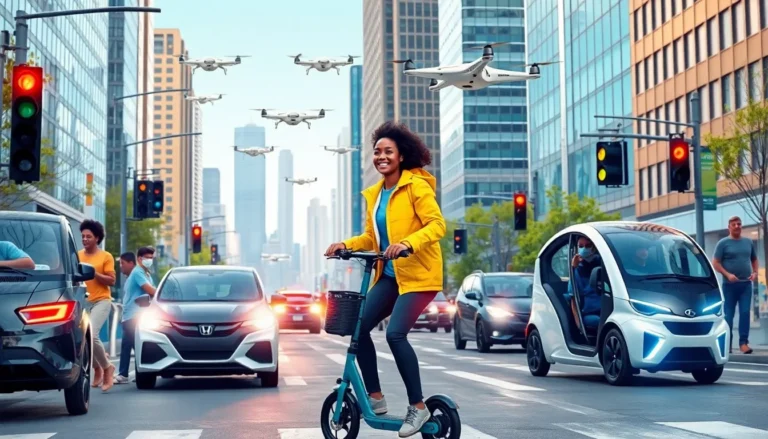Table of Contents
ToggleIn a world where smartphones are practically an extension of our hands and virtual assistants are more reliable than some family members, it’s hard not to wonder what’s next. Future technology predictions are like peering into a crystal ball—sometimes it’s clear, and other times it’s just a foggy mess that leaves us scratching our heads. But one thing’s for sure: the future holds some wild possibilities that could make even the Jetsons jealous.
Overview of Future Technology Predictions
Experts anticipate significant advancements in various fields, including artificial intelligence, biotechnology, and quantum computing. AI systems are expected to achieve unprecedented levels of intelligence, allowing them to enhance productivity across industries. Biotechnology advancements may lead to breakthroughs in healthcare, such as personalized medicine that tailors treatments to individuals’ genetic profiles.
Electric vehicles will dominate the transportation landscape as companies focus on sustainability. Innovations in battery technology promise longer ranges and shorter charging times, encouraging widespread adoption. Robotics will also evolve, integrating more seamlessly into daily tasks, making homes smarter and workplaces more efficient.
Virtual reality technologies are set to transform entertainment and social interaction. Immersive experiences will become more lifelike, allowing users to engage in ways previously thought impossible. In the realm of communication, advancements in holographic technology could enable real-time 3D interactions, bridging geographic gaps.
Data security remains a pressing concern. Cybersecurity innovations will likely evolve in tandem with growing threats, incorporating advanced algorithms to protect sensitive information. Blockchain technology will continue to shape financial transactions, ensuring transparency and security across various platforms.
5G networks are transforming connectivity, paving the way for the Internet of Things. Increased bandwidth will support smart devices, allowing them to communicate more effectively than ever. Enhanced connectivity promises to streamline various processes, from home automation to industrial applications.
Finally, space exploration stands on the brink of a new era. Private companies are investing in commercial space travel, while missions to Mars and beyond are gaining momentum. These initiatives may redefine humanity’s understanding of its place in the universe, driving further interest in STEM fields.
Emerging Technologies

Emerging technologies are reshaping industries and daily life. Experts predict transformative changes in multiple sectors.
Artificial Intelligence Developments
AI systems are advancing rapidly, enhancing productivity in various fields. They’re set to achieve levels of intelligence previously thought to be unattainable. Innovations such as machine learning and natural language processing enable businesses to analyze large datasets efficiently. Personalized user experiences improve customer satisfaction in industries like retail and healthcare. Moreover, automation is revolutionizing repetitive tasks, allowing human workers to focus on more complex responsibilities.
Quantum Computing Advancements
Quantum computing introduces new possibilities for solving complex problems. Researchers are making significant strides in developing quantum processors that outperform traditional computers. These systems promise breakthroughs in fields such as cryptography, drug discovery, and climate modeling. Enhanced computational power allows scientists to model molecular structures, accelerating pharmaceutical research. As major companies invest heavily in this technology, its practical applications are quickly evolving, transforming industries worldwide.
Impact on Daily Life
Future technology predictions signal dramatic changes in everyday life. Innovations across various sectors will reshape how individuals communicate and work.
Changes in Communication
Emerging technologies will revolutionize how people interact. Holographic communication could enable 3D virtual meetings, making remote collaboration feel more personal. Instant translation features in devices will eliminate language barriers, fostering global conversations. Social media platforms could integrate virtual reality, enhancing user engagement through immersive experiences. These advancements promise to broaden access to information, allowing users to connect with diverse cultures.
Transformation of Work Environments
Advancements in artificial intelligence and automation will redefine professional settings. AI-driven tools will streamline tasks, enhancing overall productivity. Remote work capabilities will become more sophisticated, with seamless virtual offices providing greater flexibility. Collaborative technologies will foster teamwork, regardless of geographical locations. Companies may prioritize employee well-being with access to advanced wellness tools, fostering a healthier workplace atmosphere. Overall, the professional landscape will evolve significantly, adapting to meet the demands of a tech-driven economy.
Challenges and Ethical Considerations
Emerging technologies present noteworthy challenges and ethical dilemmas. Continuous advancements prompt concerns about how society values privacy and equality.
Privacy and Security Concerns
Data privacy remains a critical issue as technology evolves. Increased reliance on AI and personal data collection heightens the risk of breaches, with hackers targeting sensitive information. Innovations in cybersecurity are essential to protect user data. Companies that leverage personal data must prioritize transparency and consent to foster user trust. Governments also play a role in establishing regulations that address privacy rights and create a secure digital environment. Ensuring effective frameworks could mitigate potential dangers while supporting technological growth.
Economic Disparities
Technological advancements may deepen economic disparities. Regions lacking access to cutting-edge technologies risk falling behind economically. Job displacement due to automation raises concerns for workers in traditional industries. Individuals with advanced skills in technology will have greater job opportunities, widening the skills gap. Initiatives promoting education and training programs can help bridge this divide. Policymakers must encourage inclusive growth by investing in technology access for underserved communities. Addressing these disparities fosters a more equitable society while promoting overall technological development.
Future Technology Predictions in Specific Industries
Technological advancements are set to transform various industries, offering novel solutions and enhancing operational efficiency.
Healthcare Innovations
Healthcare technology is on the brink of revolution. Telemedicine has expanded access to care, allowing patients to consult with doctors remotely. Artificial intelligence has the potential to improve diagnostics, predicting diseases earlier and enabling personalized treatment plans. Wearable devices monitor health metrics in real-time, empowering individuals to manage their wellness actively. Blockchain technology ensures secure patient records, streamlining data sharing while maintaining privacy. Robotics assists in surgeries, enhancing precision and recovery times. Overall, these innovations aim to improve patient outcomes and reshape the delivery of healthcare services.
Transportation Evolution
Transportation is undergoing a significant transformation driven by future technologies. Electric vehicles are becoming more mainstream, providing sustainable alternatives to traditional combustion engines. Smart traffic management systems optimize traffic flow, reducing congestion and emissions in urban areas. Autonomous vehicles promise to increase road safety by minimizing human error in driving. Advanced logistics and supply chain solutions improve efficiency, ensuring timely deliveries while decreasing environmental impact. The integration of drone technology in the transportation sector is also emerging, enabling faster shipping and delivery services. These developments collectively aim to create a more efficient and eco-friendly transportation ecosystem.
The future of technology holds immense potential for innovation and transformation. As advancements unfold across various sectors, society will likely witness a shift in how individuals interact, work, and live. With breakthroughs in AI, quantum computing, and sustainable transportation, the landscape is set to evolve dramatically.
However, these advancements come with challenges that require careful consideration. Addressing data privacy concerns and bridging the skills gap will be crucial to ensure equitable access to technology. By fostering inclusive growth and promoting education, society can navigate the complexities of a rapidly changing world.
Ultimately, embracing these technological changes will pave the way for a more connected and efficient future, one where human ingenuity and innovation thrive.







